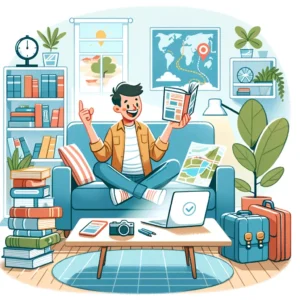Imagine waking up in a cozy hotel room, opening the curtains, and seeing a breathtaking view of a new city. You feel a surge of excitement and you can’t wait to see what adventures await you today.
So, traveling is more than just a fun way to spend your vacation. It’s a powerful way to boost your happiness and well-being.
According to recent studies, traveling can have long-lasting positive effects on your mood, creativity, and relationships.
In this article, we’ll reveal the amazing benefits of travel and how you can make the most of your trips.
Travel Has Lasting Effects on Mood, Outlook, and Relationships
The happiness benefits of travel extend beyond the time you spend on vacation itself. Research shows that traveling has positive residual effects that linger for weeks and months afterward.
Enhanced Mood
It’s no secret most people feel blissful when they’re exploring an exciting new destination. However, studies show mood improvements can persist long after the trip ends.
One reason is that having a trip planned in the future gives us something positive to look forward to. The anticipatory excitement we feel pre-trip brings its own mood-boosting benefits.
Interestingly, planning future adventures may be just as important for happiness as actually taking trips. A Dutch study found that simply dreaming about and preparing for a vacation can boost overall happiness for up to eight weeks beforehand.
More Positive Outlook
Traveling can also change how we perceive our daily lives in subtle, life-affirming ways.
Researchers have found that international travel helps broaden our perspectives. Being exposed to different cultures and ways of life encourages us to be more open-minded and appreciative of what we have.
This instills an overarching positive outlook that translates into greater day-to-day happiness at home. One study showed that positive perspective shifts inspired by international travel can last up to three months.
Improved Relationships
Shared experiences bring people closer together. When we travel with friends and family, forming memories together strengthens relational bonds in powerful ways.
Even solo traveling can enhance relationships back home. Sharing your travel stories and photos allows loved ones to experience the trip vicariously. This opens new avenues of conversation and connection.
Studies confirm frequent travelers feel more engaged and connected in their social relationships overall. They also tend to make new friends more easily compared to those who don’t travel much.
Why Travel Makes Us So Happy: 6 Key Factors

Clearly, travel offers a host of science-backed benefits for mood, outlook, and relationships. But what is it specifically about travel that makes us so happy? Let’s explore some of the top reasons:
1. Travel minimizes stress.
Being away from the daily responsibilities of work and home life is inherently stress-reducing. Travel allows us to mentally detach from problems and concerns that pile up and weigh on us when we’re not able to get away periodically.
On the road, usual anxieties fade into the background as we become fully immersed in the present moment. The carefree psychological state this induces is a key reason travel boosts happiness.
2. Travel satisfies our curiosity.
Human beings are innately curious creatures. We all have a fundamental desire to explore, discover, and expand our understanding of the world around us.
Travel allows us to satisfy this primal urge. Encountering new environments, people, cultures, cuisines, and activities feeds our curiosity in the most direct and rewarding ways possible.
Fulfilling our innate need to learn and grow is tremendously uplifting. Every new experience travel provides enhances our overall life satisfaction and contentment.
3. Travel forces us out of our comfort zones.
At home, we tend to fall into routines that keep us locked in our comfort zones. Travel pulls us out of the familiar and into unfamiliar territory.
Facing new situations head-on – like navigating a foreign city or hiking to an awe-inspiring viewpoint – triggers a thrilling sense of accomplishment. Pushing boundaries boosts self-confidence, which contributes greatly to happiness.
Travel expands our ideas about what we’re capable of. Successfully navigating novel scenarios and challenges shows us we possess hidden reserves of courage, resilience, and adaptability.
4. Travel provides a mental reset.
Daily responsibilities and stresses have a way of consuming our attention and draining our mental bandwidth over time. This leaves little room for fresh thinking and new perspectives.
Travel allows our minds to take a much-needed break. With everyday tasks off our plates, our brains suddenly have extra capacity to think, reflect, and process experiences in creative ways.
By shaking up our physical surroundings, travel also disrupts ingrained thought patterns and habits. This mental reboot is incredibly uplifting, clearing the cobwebs and negative thought loops that hold us back.
5. Travel leads to exciting new experiences.
Nothing livens up life like a steady stream of novel experiences. Travel inherently exposes us to new people, places, activities, and perspectives – the building blocks of happiness-inducing experiences.
The thrills of exploring the unknown release feel-good brain chemicals like dopamine and serotonin. The more new experiences travel delivers, the greater the chemical highs.
No two trips are ever the same. This guarantees travel provides a non-stop infusion of excitement and novelty that simply can’t be replicated going about daily life at home.
6. Travel provides captivating memories.
It’s been shown that experiences bring more happiness than material possessions. Travel is perhaps the ultimate accumulator of joy-producing experiences.
The sights, smells, tastes, and discoveries of our trips create powerful memories we can recall any time for an instant mood boost. Having a bank of captivating travel memories enhances satisfaction with life as a whole.
Even better, sharing travel stories and photos allows us to relive the highlights and recapture some of that on-the-road magic once we’re back in our daily routines.
7 Tips for Maximizing the Happiness Benefits of Travel

Clearly, traveling more often provides tangible boosts to our overall happiness and life satisfaction. But certain tips and strategies can help you squeeze even more mood-enhancing juice out of your precious annual vacation time.
1. Set plenty of trip goals.
Having goals and must-do activities mapped out will help maximize enjoyment and prevent restlessness or boredom from setting in on longer trips. Mix obvious sights with some offbeat, under-the-radar items for the fullest experience.
2. Learn key phrases in the local language.
Putting in just a small effort to use the local lingo will enhance interactions with residents. Knowing even just a few common phrases improves the cultural immersion process exponentially.
3. Keep a journal.
Jotting down observations, musings, and standout moments makes it easier to carry the psychological benefits of traveling home with you. Re-reading later will help recapture the trip’s magic.
4. Share lots of photos.
Curate your best trip photos to share on social media. Seeing your adventures will spur friends and family to engage, ask questions, and reinforce social bonds.
5. Splurge on novel experiences.
Go for unique activities you can’t easily do at home, like learning regional cooking styles or getting tickets to culturally significant venues. These exceptional experiences deliver happiness dividends.
6. Schedule time for reflection.
Bookend trips with quiet time to absorb lessons learned and changes in perspective. Look for parallels between your destination’s story and your own journey through life.
7. Start planning the next trip.
Combat post-vacation letdown by planning your next adventure right away. Having another remarkable experience to look forward to will lift your spirits.
Travel Is an Investment in Long-Term Happiness
In today’s busy world, it can be tempting to save time and money by skipping non-essential trips. But the compelling research shows travel should be viewed as a crucial investment in our mental health.

